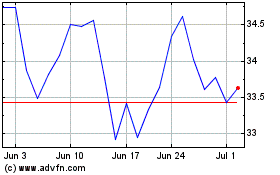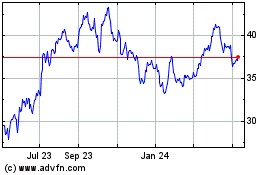Carlyle Angles for Oil Deal -- WSJ
April 15 2016 - 3:03AM
Dow Jones News
Private-equity firm looks to outflank GE for assets from
Halliburton and Baker Hughes
By Dana Mattioli and Ryan Dezember
Private-equity firm Carlyle Group LP is in serious talks to buy
a package of oilfield-services businesses from Halliburton Co. and
Baker Hughes Inc. that could be valued at more than $7 billion, as
the energy giants seek to overcome a Justice Department challenge
to their planned merger.
Talks between Carlyle and the companies are far along, though
not yet exclusive, people familiar with the matter said. The talks
mark a shift for Halliburton and Baker Hughes, which for months
have been focused on reaching a deal to sell the assets to General
Electric Co.
GE and the energy companies have had problems agreeing on a
price for the assets, some of the people said. GE is still in the
mix, they added. Carlyle's specialty, though, is creating
stand-alone businesses from castoff units of larger companies.
The need for Baker Hughes and Halliburton to strike a
divestiture deal took on increased urgency last week when the
Justice Department filed an antitrust lawsuit challenging their $35
billion proposed deal, arguing it would threaten higher prices and
reduce innovation in the oilfield-services industry. The two sides
agreed to the deal in November 2014.
As always, the talks with Carlyle could fall apart before an
agreement is reached, and even if there is one, there is no
guarantee the government won't stand in the way.
Last week, Justice Department antitrust chief Bill Baer said,
"There's no fix to this transaction." He also said the gap between
the two sides was "a chasm" and that settlement talks were never
really under way because the government and the companies
fundamentally disagreed on the competitive impacts of the
merger.
In an attempt to alleviate regulatory concerns, Halliburton and
Baker Hughes last year pledged to sell businesses with $5.2 billion
in 2013 revenue; more recently, they proposed to sell additional
businesses. Included in the divestiture portfolio are businesses
that make various types of sophisticated drill bits and others that
put the finishing touches on wells that are drilled but not yet
producing.
Following the Justice Department filing, the companies said
their divestiture plan would "facilitate the entry of new
competition in markets in which products and services are being
divested." The companies said the government's move to block their
merger "is counterproductive, especially in the context of the
challenges the U.S. and global energy industry are currently
experiencing" and added they "intend to vigorously contest" the
lawsuit.
Oilfield-services companies sell supplies and advice to energy
producers and provide services such as drilling and hydraulic
fracturing, the rock-cracking process that has enabled a boom in
U.S. oil and gas production.
Since Halliburton and Baker Hughes agreed to combine, the
industry has faced severe setbacks as persistently low crude prices
have slashed demand. Many of the mom-and-pop oilfield services
businesses that crowd the space have folded as drilling activity
slowed in response to low energy prices, while others are offering
their services at or below break-even prices.
The Justice Department said in its suit that Halliburton's
divestiture plan "appears to be among the most complex and riskiest
remedies ever contemplated in an antitrust case," requiring the
separation of businesses that share facilities, employees,
software, intellectual property and customer contracts.
In the absence of any settlement between the companies and the
Justice Department, the outcome will be decided at trial.
Carlyle, based in Washington, D.C., is among the buyout firms
with the most experience navigating the capital. The firm got its
start in the late 1980s buying businesses shed by the government in
a wave of privatizations, setting them up to run as independent
concerns, and then selling them -- often at hefty profits.
Over time, Carlyle adapted its experience in carving out defense
contractors and other businesses from the federal government to
plucking out-of-favor units from large corporations. In recent
years, the firm has invested in deals to acquire units of United
Technologies Corp., Illinois Tool Works Inc., Johnson & Johnson
and DuPont Co.
Carlyle's $4.9 billion acquisition in 2013 of DuPont's
paint-making unit, now known as Axalta Coating Systems Ltd., has
been one of the most lucrative investments in the firm's
history.
The carve-out approach has helped Carlyle invest large sums from
its private-equity business at a time when takeovers of entire
companies have become less common amid high company valuations and
the mixed performance of the last wave of big buyouts.
An acquisition of Halliburton and Baker Hughes' businesses also
would coincide with Carlyle's increased presence in energy. The
firm in 2012 acquired a controlling stake in energy-focused
private-equity firm NGP and has since raised several pools of cash
to invest in various facets of the industry.
--Alison Sider, Ted Mann and Brent Kendall contributed to this
article.
Write to Dana Mattioli at dana.mattioli@wsj.com and Ryan
Dezember at ryan.dezember@wsj.com
(END) Dow Jones Newswires
April 15, 2016 02:48 ET (06:48 GMT)
Copyright (c) 2016 Dow Jones & Company, Inc.
Halliburton (NYSE:HAL)
Historical Stock Chart
From Mar 2024 to Apr 2024

Halliburton (NYSE:HAL)
Historical Stock Chart
From Apr 2023 to Apr 2024
